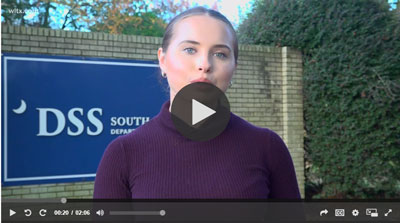


Students at SC School for the Deaf and Blind get safe, open space to be active
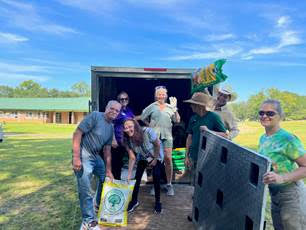
CareSouth organizes community gardens to fight food insecurity in Society Hill

Driving 30-45 minutes to buy groceries is a burden that residents in Society Hill face every day because there isn’t a grocery store in the community. Residents only have access to unhealthy food at local convenience stores and the local Family Dollar. CareSouth and community volunteers are changing that by creating a community garden where residents can plant and grow fruits and vegetables for free.
CareSouth was one of 13 organizations that recently received a healthy eating and active living (HEAL) mini-grant from Wholespire to address food insecurity. The community garden is located on the historical site of St. David’s Academy, a property that CareSouth acquired for renovation and office use. They generously agreed to reserve part of the property for the community garden.
“The raised bed gardens have already been built for community members to plant and maintain their fall gardens,” said Christy Beasley, community health educator at CareSouth. “Retired farmer and community garden volunteer Dick Baird is leading the project by starting seeds on flatbeds, helping families plant their gardens, and providing expertise on maintenance.”
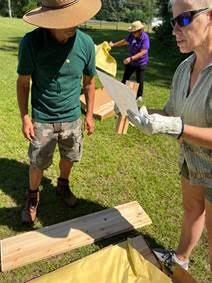
Beasley says four families have planted fall gardens, and they expect more families to take advantage of this free resource in the Spring. She says Society Hill is buzzing about the gardening opportunity and four people donated money to the project.
“I have met personally with members of the community at the local school. Teachers, parents, staff and community members are extremely interested in a community garden to learn about gardening, nutrition and working with others in the community,” says Beasley.
In addition to encouraging community members to plant and maintain their garden plots, project plans will include education about planting seeds, pests and weeds, seed saving, and harvesting and cooking the fruits of their labor. Ultimately, Beasley hopes this gardening experience will give community members the confidence to grow gardens in their backyards.
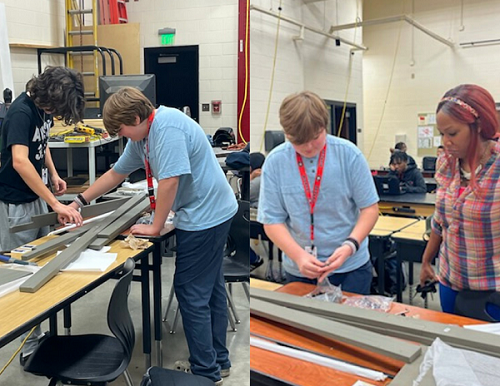
City of Clinton, YMCA and others partner to feed the community

Residents in Clinton and its surrounding areas have limited opportunities to be active and obtain nutritious food, however, local leaders are in the process of changing that. Wholespire recently awarded the City of Clinton a healthy eating and active living (HEAL) mini-grant to build a fueling station housed at the YMCA of Clinton.
According to their mini-grant application, the City of Clinton is partnering with the YMCA of Clinton to create an onsite fueling station that will supply nutritious foods to the community free of charge. They recruited students from Clinton High School to build and assemble the shelving unit located at the YMCA. High-quality and nutritious food will be gathered, gleaned, and purchased from local food partners including local farms, grocers, and donors.
“The most common complaint shared by guests of the YMCA is the high expense of food, especially healthy food. They try to balance a healthy lifestyle by working out, but more often than not, they will go home and eat something that is not very healthy,” said City of Clinton Community Relations Specialist Lacresha Dowdy.
Residents have access to only two grocery stores, but they are both on one side of town, which puts many of people at a disadvantage in accessing affordable or good-quality fresh food. Data from the South Carolina Department of Health and Environmental Control indicates that Laurens County has a 26.2% higher food insecurity rate among children and 24.1% among adults when compared to the state average. Health outcomes are also poor with high rates of diabetes (13.8%), obesity (38.5%) and elevated child BMI demonstrated in school surveillance data.

Dowdy added, “The data tells us that the problems of hunger and food insecurity and the epidemic of diabetes, obesity and obesity-related chronic disease have become daunting concerns. The statistics speak for themselves in that 100% of middle and high school students are eligible for free or reduced lunch; and 13% of adults record having limited access to healthy foods, higher than 9% rank for SC.”
Providing free food to the community isn’t the only purpose of the fueling station project. In addition to providing produce and other food items from their farm, LushAcres Farm will allow gleaning field trips for Laurens County School District students. This experience will allow youth to be more conscience of healthy food environments and increase their understanding of the larger food system.
Another component of the project includes educating the community on nutrition, proper food preparation, kitchen safety and cooking skills provided by Clemson Youth Learning Institute SNAP-Ed. Classes will be held for youth, teens, and adults.
The City of Clinton is one of 13 communities that received funding for projects that support populations in need of community resources like the fueling station, playground equipment, school gardens, and hydration stations.
The HEAL Mini-Grant initiative is made possible by a grant from the BlueCross® BlueShield® of South Carolina Foundation, an independent licensee of the Blue Cross and Blue Shield Association.
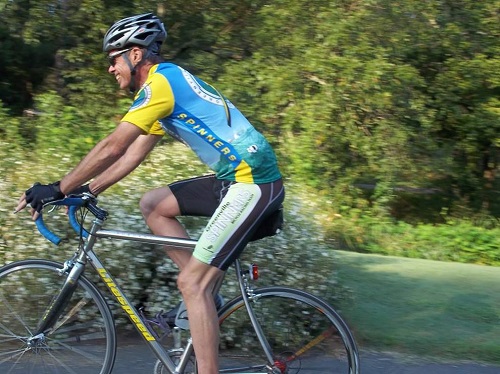
The City of West Columbia will fulfill residents’ requests for bike racks

After collecting feedback from residents for an updated bicycle and pedestrian plan, the City of West Columbia will install bicycle racks in various locations throughout the city. The addition will complement the connectivity of parks, trails, and bike lanes and provide cyclists with a safe way to temporarily store their bicycles.
The City of West Columbia is one of 13 communities that recently received a healthy eating and active living (HEAL) mini-grant from Wholespire, a nonprofit that helps organizations and community coalitions increase access to healthy choices. The mini-grant allows West Columbia to purchase 12 bike racks and install them at locations such as parks, the River District, Triangle City, and other highly traversed areas of the city.
“Over the last several years we’ve worked to expand safe accessibility for bicycles and pedestrians throughout the city. We are thankful for these bicycle racks so that people can ride around town, stop, and enjoy the local parks, businesses, and restaurants, all while never having to get into a car,” said Mayor Tem Miles.
During a 2021 update of their Master Bicycle and Pedestrian Plan, the City of West Columbia sought feedback from residents to identify their current priorities. Bike racks were one priority.
“As an individual who is a recreational cyclist, an occasional bicycle commuter, and a father who enjoys a family stroll through the neighborhood and parks, I see the addition of bike racks for public use in West Columbia as the logical next step to aid both current and prospective bikers to move around town,” says Joel Mathwig, West Columbia resident. “Having a convenient and safe location to temporarily store a bike – whether to enjoy a park, go shopping, get to work – can only encourage more bicycle use and more physical activity.”
The West Metro Bike and Pedestrian Master Plan identify a clear strategy for near- and long-term active transportation projects within the West Metro area. The goals identified by the plan are to:
- Complete a connected and accessible network of bike and pedestrian facilities,
- Improve safety for all modes of transportation,
- Provide a comfortable network that encourages biking and walking for users of all ages and abilities, and
- Provide equitable access to bike and pedestrian facilities and cultivate an environment of respect for all modes of transportation.
The City of West Columbia, the Central Midlands Council of Governments, the City of Cayce, and the City of Springdale created The West Metro Bike and Pedestrian Master Plan in 2017 and adopted the plan in 2018.
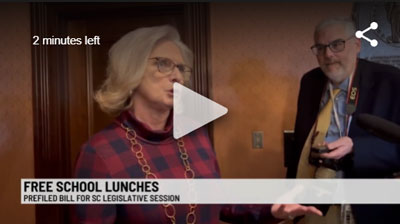
New legislation would provide free meals for South Carolina students
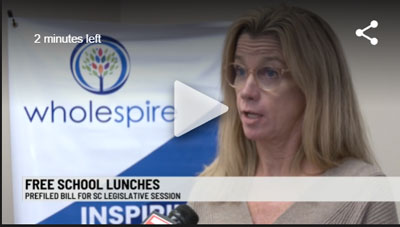
New legislation would make school meals for SC students free
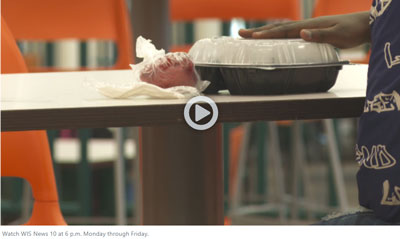
New legislation would make school meals for SC students free
